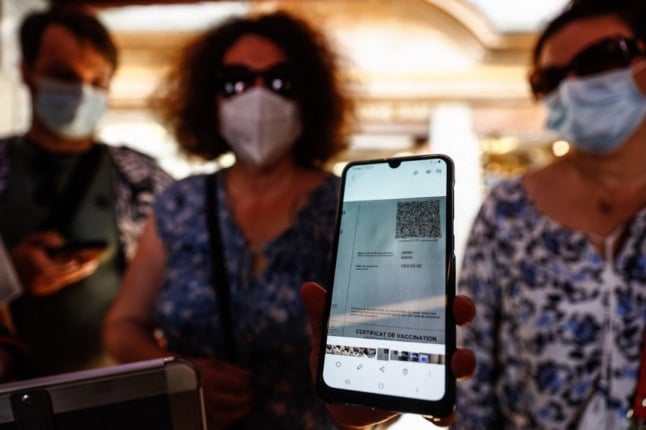France, Austria and Portugal have a health passport for daily affairs, Ireland and Malta plan to adopt one in July and Italy has just approved it.
An increasing number of members of the EU27 are on board with the idea of using digital health passports to limit entry to public places where Covid infections tend to occur: big concerts, gyms, bar and restaurant interiors, to name a few.
So will Spain follow in the footsteps of other European nations and put limits on something as intrinsically Spanish as meeting friends for a beer at the bar?
On July 22nd, Galicia became the first territory in Spain to require its citizens to show proof of their Covid health status to gain access to the interior of cafés, bars and restaurants.
Residents of municipalities with a high or very high infection rate have to show proof that they are immunised against Covid-19 or that they don’t have the virus if they want to go inside their local bars and restaurants.
The measure still has to be ratified by the Galician High Court but bar and restaurant owners have already started asking customers for proof of a Covid ‘health pass’ or closing their interiors completely to the public to avoid possible fines, according to local news sources.
READ MORE: Galicia becomes first region in Spain to require Covid ‘health pass’ to access bars, restaurants
On the same day, the Canary government confirmed that customers at cafés, bars and restaurants on the island of Tenerife, which has just been moved up to risk level 4, will also require a Covid Digital Certificate to access the interior of these establishments from Monday July 26th.
If any of the other islands of the archipelago move up to level 4 as their Covid infections rise, their inhabitants will also have to show proof of vaccination, testing or recovery to go inside these hospitality establishments, with the QR Code of the Digital Covid Certificate being the preferred form of proof.
The regional government has been hinting that the health pass requirement would be introduced since its request to bring back the curfew as a means of curbing rising infections was rejected by the Canary High Court.
“We’re going to try to make it so it’s not possible to access the interior of establishments without having a vaccination certificate,” said Canary President Ángel Pérez on July 14th.
“This does not mean that you won’t be able to go to your local bar or store” Pérez stressed, adding that it’s still necessary to study “in which places the health pass should be required, how it will be organised and what type of controls should be introduced”.
How to get a Digital Covid Certificate in each of Spain’s regions
 Photo: Kenzo TRIBOUILLARD / AFP
Photo: Kenzo TRIBOUILLARD / AFP
Up to now the Digital Covid Certificate, which is issued by Spain’s 17 regions, has been used solely for the purpose of facilitating travel.
In France, the health passport can show one of three things – vaccination status, a recent negative Covid test or recent recovery from Covid.
French president Emmanuel Macron announced that over the next month the use of France’s pass sanitaire will be greatly increased to include a number of everyday holiday activities such as going to cafés and restaurants, visiting museums and tourist sites and travelling on long-distance train or coach journeys.
People in Italy will also soon need the pass to enter gyms, swimming pools, museums, cinemas, theatres, sports stadiums and other public venues, including indoor seating areas at bars and restaurants, Italian Health Minister Roberto Speranza stated at a press conference on Thursday.
Vaccine hesitancy is not so much of a problem in Spain, but the country’s rising fortnightly infection rate is, having risen more than sixfold over the past month to 661 cases per 100,000 people on July 23rd.
Among young people in their twenties, the prevalence of the virus is triple that rate.
The reopening of the nightlife venues, the end of the school year, the low vaccination rate among younger age groups and the rampant spread of the Delta variant have all contributed to making Spain’s infection rate the highest in the EU together with Cyprus’s and Portugal’s.
Whether the recently tightened restrictions and the closure of the nightlife venues in some regions will have an impact on the incidence of Covid-19 will be reflected in the data in the coming days, but Spain could benefit from having more control through a system that’s already in place: the Digital Covid Certificate.
Apart from Galicia and the Canary Islands, Valencian regional authorities have also suggested they want to adopt a health pass system for entry to cafés, bars, restaurants and the interior of other establishments, but this has been ruled out as “not possible” by the hospitality industry for the queues and holdups all the checks will allegedly cause.
The regional government of the Balearic islands is also in favour of adopting health passports for bars, restaurants and nightclubs.
Other regions such as Aragón, Castilla y León and the Basque Country have ruled out the possibility of requiring health passports from citizens in the form of QR codes.
READ ALSO: Is this the future of bar culture in Spain? One region now requires QR code to be served
Health passports are deemed discriminatory by some experts and sectors of society who see them as limiting personal freedoms and privacy.
In Spain’s case, they put limits on the quintessential Spanish habit of eating and drinking out.
Crucially, one other common trait could hinder the efficiency of health passes in Spain: the fact that young Spaniards always find a way of having fun, and if they’re barred from interiors they’ll take the party outdoors as they do already: with botellones (street drinking) believed to be behind many of the Covid-19 infections among youngsters.
READ ALSO:



 Please whitelist us to continue reading.
Please whitelist us to continue reading.
Member comments